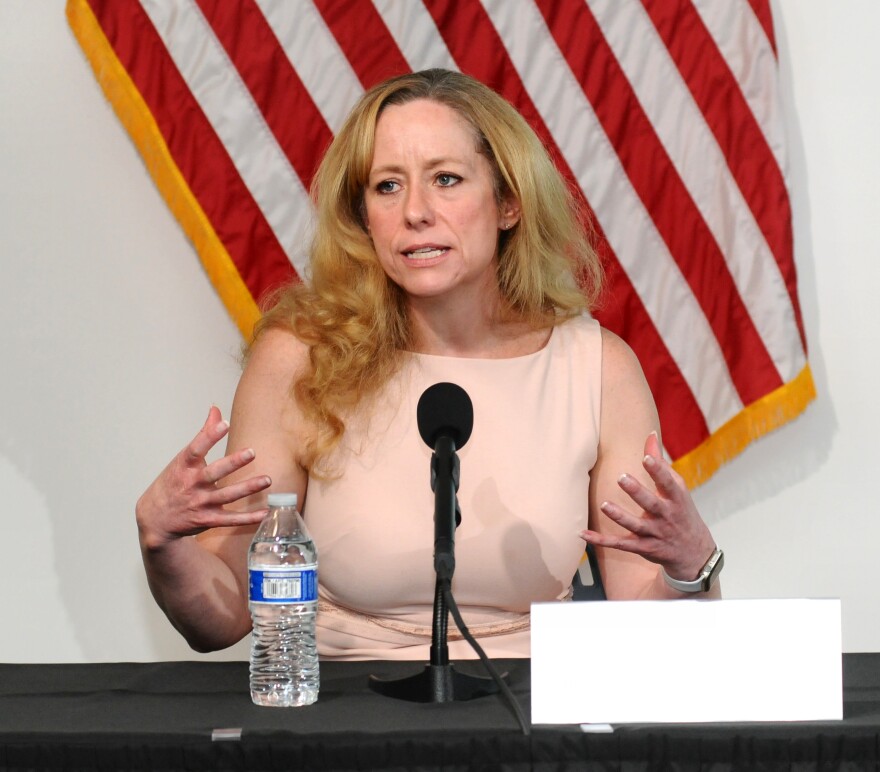By Howard Fischer
Capitol Media Services
PHOENIX -- The state's top health official testified Thursday she cannot say what indicators will be used to determine when the COVID-19 health emergency is over and the governor's emergency orders are no longer necessary -- and when Arizonans can get their lives back to the way they were before.
In fact, Cara Christ said a decline to minimal levels in the benchmarks her agency created to determine the risk of spread won't necessarily lead her to recommend to her boss, Gov. Doug Ducey, that he dissolve his orders and give up the emergency powers he assumed in March. She said there are other considerations.
But Christ also said that the emergency declaration may go end even if people are still getting sick and dying of the virus. She said it may just be that Arizonans are just going to have to live with it.
What currently makes any disease an emergency, she said, is that it could overwhelm hospitals. That Christ said, is why there was a declaration in March by her boss, Gov. Doug Ducey, with the rapid spread of the coronavirus.
At some point, though, she said that won't be the case.
"That would change with COVID-19 as we continue in this pandemic,'' Christ said.
"And then it would just be like living with the influenza,'' she continued. "At that point it wouldn't be a public health emergency any more.''
Christ's comments came as she was being questioned in a hearing in Maricopa County Superior Court by Ilan Wurman.
He represents more than 100 owners of bars that remain unable to reopen and operate the way they used to due to the Ducey-declared emergency. And Wurman is trying to convince Judge Pamela Gates that the restrictions on bars make no sense, especially with other businesses, including restaurants that serve alcoholic beverages, are allow to be open.
All that relates to when Christ thinks the emergency -- and the restrictions on business operations, including bars imposed by Ducey -- will or should go away.
"That's hard to predict now because we learn new things every day,'' she testified.
One issue in the case is how long Ducey can exercise his emergency authority.
Wurman said there are indicators. He pointed out the health department has established "benchmarks'' to determine the risk of spread of the virus.
These look at three issues: the number of cases per 100,000 residents, the percent of tests for the virus that come back positive, and the percent of patients showing up in hospital emergency rooms with COVID-like symptoms. Each of those can be listed as having a substantial, moderate or minimal risk of spread.
Wurman wanted to know at what point those benchmarks will get to a point when the emergency will be over.
"It's a little bit difficult,'' Christ responded.
"Those benchmarks weren't established to determine an end to the public health emergency,'' she said. "They were really established to set benchmarks for business to be able to reopen and schools to go back into session.''
That didn't satisfy Wurman.
He told her to assume there will be no vaccine, no "therapeutic'' to effectively treat the disease, and no "herd immunity'' where enough people have contracted the virus, survived and now have antibodies. Given all that, Wurman asked Christ when she would be willing to recommend to Ducey that he rescind his emergency orders.
"If we were consistently at very, very low cases, if CLI (COVID-like illnesses) stayed low and and the percent positivity remains low, below that 3%, we may make that recommendation,'' she responded. But no promises.
"Again, it's hard to predict,'' Christ said.
Wurman pressed harder.
"If all three of the benchmarks established by your department indicated we had been at minimal transmission for eight weeks, would that be sufficient for you to recommend repeal?'' he asked.
She never responded after attorneys for the state objected, saying she had already answered the question.
One thing Christ did say is that the emergency declaration really isn't primarily about preventing people from getting sick and wiping out the disease.
"The public health emergency is really protecting our health care system, making sure we keep as few people from getting sick or dying and having access to those resources than it is just eradicating the disease,'' she said.
Christ did concede that she could not say whether a single case of coronavirus had been traced to a bar in Arizona. But she said that's not because none has happened.
"I'm not privy to the contact tracing investigation findings,'' Christ said.
But the health director said she remains convinced that the risk of spread is higher at bars than at other businesses.
Some of it, she said, has to do with lack of ventilation indoors.
"There are ways that that can be increased,'' Christ said. "But alcohol does tend to affect one's ability to physically distance and make good decisions.''
And then there's the environment.
"They tend to have music,'' she explained.
"It requires people to speak louder, projecting more droplets into the air, putting more virus,'' Christ said. "It also requires people to lean in and get closer to individuals when they are talking because it's going to be loud.''


